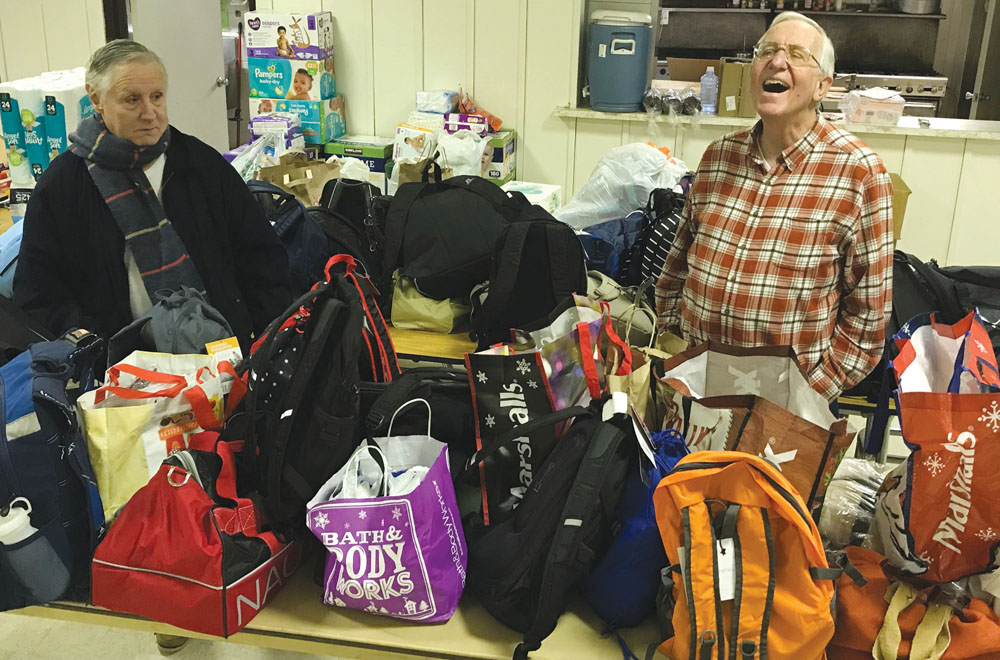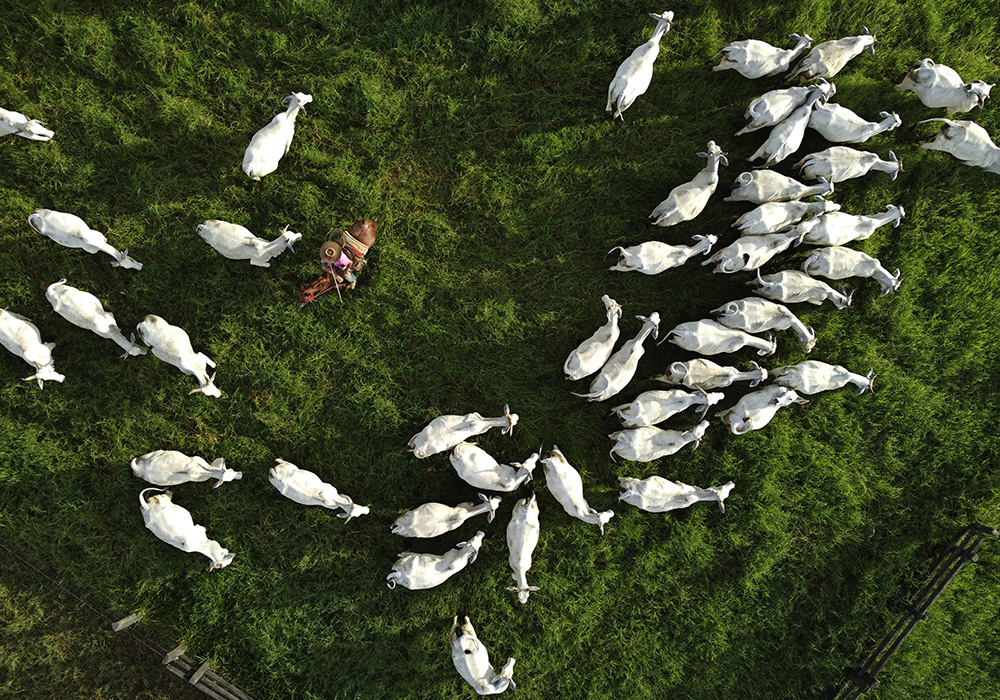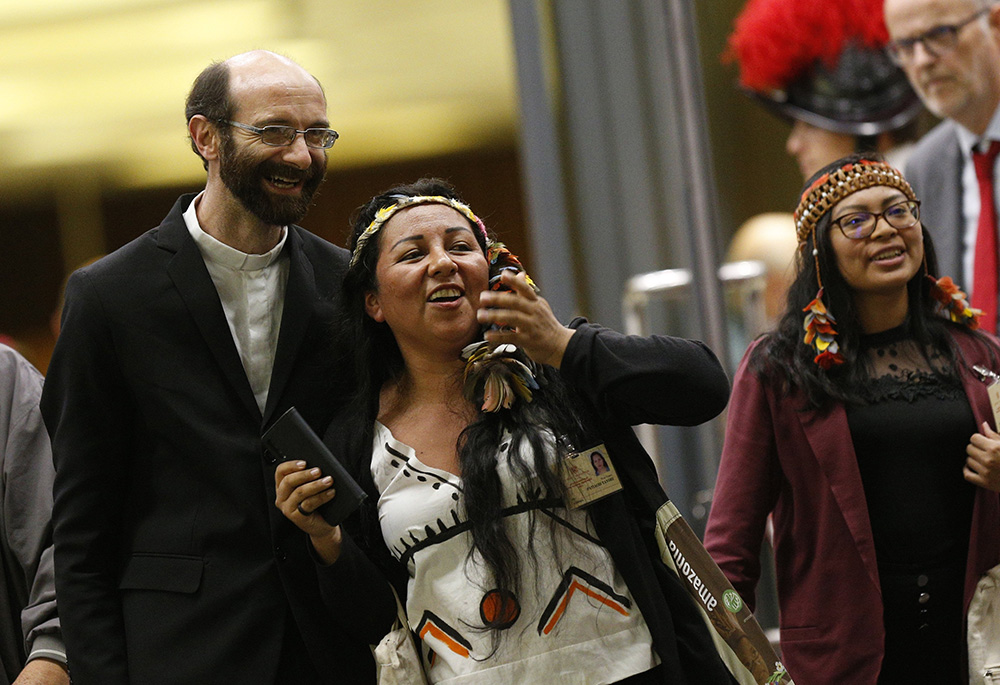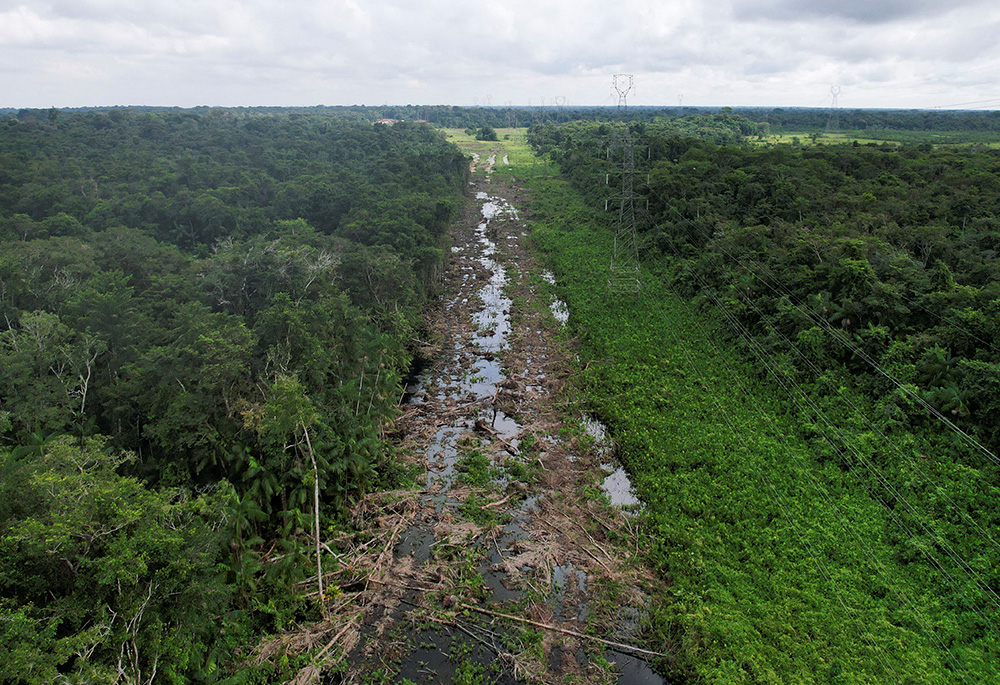
Jim Collins, right, and Greg Wright are pictured with new backpacks, filled with toiletries, clothes and luxuries, that arrived Nov. 29, 2018, for fellow parishioners at St. Thomas More Parish in Paradise, California, where some 640 of 800 community members lost their homes in the Camp Fire in early November. (CNS/Christina Gray, Catholic San Francisco)
"Fraternity and Integral Ecology" is the theme of this year's Fraternity Campaign, a Lenten effort by the National Conference of Bishops of Brazil (known by the Portuguese acronym CNBB) to collect funds for its social works and raise awareness of a pressing issue. The idea is to present numerous challenges concerning the environment and ways to overcome them, pointing to a number of emergency transformations on individual and social levels that are necessary to avoid greater catastrophes.
It's not the first year that environmental problems have been selected by the National Conference of Bishops of Brazil as the campaign's subject. In 2025, however, the campaign's documents have an urgent tone, incentivizing churchgoers to make commitments to our common home and undergo ecological conversion.
While church movements and activists work to spread the message to more people, traditionalist Catholic organizations have been campaigning for a boycott, arguing that the funds would finance communist works — an accusation that they have repeated in recent years — and casting doubt on the conference's reasons for promoting integral ecology.
Despite the theological and scientific basis of the central campaign document — a team of 50 doctoral scholars in different fields of knowledge, from theology to biology, took part in the text's drafting and revision — traditionalist groups have also accused it of perverting the meaning of Lent.
"The current heads of CNBB want to substitute the spirit of Lent with a materialist focus on integral ecology, transforming the church into an environmentalist nongovernmental organization," Alvaro Mendes, president of Centro Dom Bosco said on a video disseminated on social media.

A cowboy sorts cattle in a corral at the Fazenda Itaituba, a farm in the municipality of Bujari, near the city of Rio Branco, Acre state, Brazil, on May 23, 2023. (AP photo/Eraldo Peres)
He called some of the document's contents, such as criticism of cattle ranching, "not fraternal" and said that the "negative sentiments" incentivized by the Fraternity Campaign are inadequate, given that such an economic activity has been sustaining the lives of many Brazilians and producing food for several countries around the globe.
Other entities, like the Plinio Corrêa de Oliveira Institute or IPCO, have also released videos criticizing the Fraternity Campaign.
Sociologist Márcia Maria de Oliveira, a professor at the Federal University of Roraima and an expert in Amazonian social issues, is one of the lay Catholics that wrote the document. A member of Catholic groups and an adviser of several ecclesial organizations — including the Pan-Amazon Ecclesial Network (known by the acronym REPAM) — de Oliveira was one of the Amazonian women invited by Pope Francis to take part in the Amazon synod, in 2019.
"The universities are more and more concerned with climate change and that global system that doesn't respect the limits of nature. The church has been more and more open to science, inviting specialists to contribute with reflections about the necessary interventions," she said.
Climate change denialism, said de Oliveira, is based on shallow ideas and has no acceptance among serious scientists and among conscious Catholics.
"We don't need to be worried about denialism, because it comes from people without any kind of recognition in any field. There are people who just don't want to commit to any change. Our efforts are directed to good-willing people," de Oliveira said.

Fr. Dario Bossi, Patiachi Taylor and Leah Rose Casimero leave the final session of the Synod of Bishops for the Amazon at the Vatican Oct. 26, 2019. "If we don't put a break on global warming right now, we'll declare our defeat and get into a cycle of irreparable consequences and crises," Bossi told NCR. (CNS/Paul Haring)
Fr. Dario Bossi, a member of the National Conference of Bishops of Brazil's Special Commission on Mining and Integral Ecology, argued that climate change denialism is generally connected to economic or ideological interests. This campaign targets people who want to know what's happening on the planet and in our societies, especially those who have been feeling discouraged by difficulties posed in the current scenario.
"If we don't put a break on global warming right now, we'll declare our defeat and get into a cycle of irreparable consequences and crises," he said.
The integral ecology theme was suggested two years ago by the mining and integral ecology commission, a group headed by Bishop Vicente de Paula Ferreira and formed by a number of priests in order to monitor the impacts of mining on Indigenous peoples and other traditional populations and to raise awareness of integral ecology.
"This year, it's the 10th anniversary of both the encyclical Laudato Si' and of the foundation of REPAM. We also have to recall the 800 years of St. Francis of Assisi's "Canticle of the Sun," said Fr. Jean Poul Hansen, an CNBB adviser in charge of campaigns. A foundational literary work for Catholic environmentalism, the canticle has been an inspiration for Pope Francis.
2025 is also the year Brazil will host the United Nations Climate Change Conference, COP30, which will happen in Belém, in the Amazonian Pará state, in November.
Church activists, along with Indigenous and peasant leaders, are not hopeful about the conference's outcomes in an era when climate denialism has been growing alongside the populist right wing in countries like the U.S and Argentina.

A drone view Feb. 4, 2025, shows the 8-mile-long Avenida Liberdade being constructed through protected rainforest to Belém, Brazil, which will host the United Nations Climate Change Conference (COP30) in November. (OSV News/Reuters/Adriano Machado)







